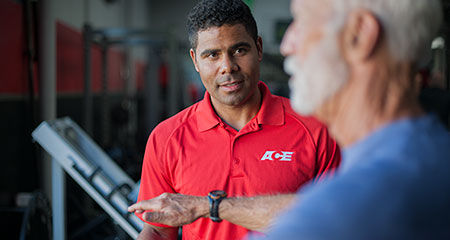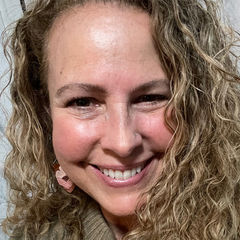
Whether you’re a novice or a veteran in the fitness field, finding a specialty and carving out a special niche is a path to consider for your career.
Is Specialization Confining?
A common fear among health and fitness professionals is that specializing in one area will limit them in both income and opportunities. After all, isn't the point to help as many people as possible? And won't limiting who you work with also limit how much money you're bringing home?
Quite the opposite, retorts Brad Davidson, author of The Stark Naked 21-Day Metabolic Reset and a certified functional diagnostic nutritionist. “Specialization is a game-changer and really the only way to stand out in the market,” says Davidson, who has carved out a niche working with CEOs. “Every trainer I know who has a successful training business these days has a focus on specialization.”
Lee Jordan, an ACE Certified Personal Trainer and Health Coach, and an ACE Behavior Change Specialist, agrees. “From a purely business perspective, my specialization has better positioned me to work with physicians and be of value to them, which facilitates referrals. In specializing, you will naturally become more focused. By understanding exactly who you are as a pro and who your clientele is and is not, results are improved and less time and marketing dollars are wasted.”
“I was told years ago that if I focused in on my gift [of helping alleviate chronic pain in others], I would alienate myself from the fitness industry,” explains Sue Hitzmann, creator of the MELT Method and author of The MELT Method: A Breakthrough Self-Treatment System to Eliminate Chronic Pain, Erase the Signs of Aging and Feel Fantastic in Just 10 Minutes a Day! “The exact opposite occurred. I’ve become a pioneer in hands-off bodywork and I see how my work has altered how others express pain, movement and regard the fascia or connective tissue system.”
How Do I Know if Specialization is Right for Me?
In deciding to specialize, there are a few things to take into consideration. There was one common theme that all the experts interviewed for this article agreed on: Specialize in an area you're passionate about. And for many of them, their passion and, subsequently, their specialization, came naturally due to having firsthand experience in that area.
Hitzmann, for example, became interested in treating chronic pain after she experienced it herself. Jordan specializes in helping people who struggle with morbid obesity, as he, too, struggled with obesity and the limitations it placed on his life. CEOs tend to be high-energy, type-A personalities. Davidson says he’s built the same way and literally almost killed himself with his over-achieving personality.
Karin Singleton is an ACE Certified Medical Exercise Specialist, holds an ACE Specialty Certification in Orthopedic Exercise and is the owner of Fitness Personified in Raleigh, N.C. Her decision to specialize in corrective exercise grew out of her own experience with injuries.
“I joined a gym and quickly realized that the training staff there was quite capable of directing healthy people toward proper exercise, but I felt I was on my own when it came to finding a program for my own musculoskeletal problems,” Singleton explains.
In considering a niche, Singleton also encourages fitness pros to take into account the demographics of your area. “If you look to specialize, find something you are passionate about, but also consider that you need to pay your bills.”
What are you passionate about? What gets you excited when you think about it? Now ask yourself if the community you live in is large enough to support that passion as your specialty.
One way to alleviate the fear of specializing is to gradually progress into your specialty or choose a specialty that is broader in nature. For example, ACE’s top three Specialty Certifications—Behavior Change, Fitness Nutrition and Weight Management—all have more far-reaching possibilities compared to specializing in working with clients with Parkinson’s Disease, for example.
Mike Curry, an ACE Certified Personal Trainer and creator of StrongBoard Balance, has carved out a successful niche in posture and balance. “I don't feel like specializing in balance has limited me in any way, because everyone can make improvements on their balance,” he says.
“It’s easy to fall into the trap of believing that, in order to sign the maximum amount of clients, you need to appeal to the maximum amount of people,” explains Bedros Keuilian, founder and CEO of Fit Body Boot Camp. “But no one wants to hire a trainer who’s just okay at everything. Your prospects want an expert with specific knowledge in the areas that matter to them. Specialists get paid more, they’re more respected and they're easily differentiated from the crowd of basic trainers vying for everyone’s attention.”
Keuilian adds, however, that you also need to be realistic when first embarking down the specialization path. “If you're considering specializing, the one caveat I can offer is this: Make sure there are enough people in your community who are seriously interested in your potential area of specialization. You won't experience any of the benefits of specializing if your area of expertise is so uncommon that no one has any interest in training with you."
A Few Things to Consider
In choosing an area of specialization, it’s important to work within your scope of practice. For instance, becoming an ACE Fitness Nutrition Specialist does not qualify you to prescribe diets for clients as a registered dietician would. In the same way, becoming an ACE Orthopedic Exercise Specialist doesn’t qualify you to diagnose musculoskeletal issues as a physical therapist or orthopedist would.
“I think the biggest challenge regarding my specialty is that people sometimes assume I can diagnose their condition and fix it,” agrees Singleton. “I am a stickler when it comes to scope of practice. This has served me well over the years when working with physical therapists and other healthcare providers.”
Sometimes one area of specialization can roll into another specialization. It can also pave the way to networking and receiving referrals from other medical and wellness professionals, further establishing you as a specialist in your field.
As a Pilates instructor, Eva Wennes, owner of EuroPilates Corrective Exercise and Pilates Studio in San Diego, Calif., knew many of her clients were being referred to her by their healthcare providers to help them move and feel better. “I felt hugely responsible for their well-being and I was eager to seek out new techniques and methods to become a truly valuable asset to my clients.”
Wennes already had a Pilates certification under her belt and expanded her knowledge base and credentials by becoming a Corrective Exercise Specialist in the The BioMechanics Method.
Specializing and earning a specialty certification in an area does not necessarily mean you use only one specific method. Learning various approaches and educating yourself adds to your toolbox and credibility and gives you more from which to draw.
“I went through two different tracks [while establishing myself as a specialist in my field],” says Singleton. “One was to educate myself through any means available when faced with a new client situation. The other was to get specialty certifications so that I could present myself as such and had the backing of documented credentials.”
Deb Preachuk, founder and owner of Pain Free Posture MN, located in Lakeville, Minn., adds, “Finding a certification that allowed me to address others’ chronic pain within scope of practice, as well as provide programming that includes a full assessment, self-myofascial release and corrective exercises—which can be a hybrid of modalities—was what I really needed and found in The Biomechanics Method. This is a field of continuous learning. You must love the challenge of a problem and the process of discovering the right solutions for your clients. A one-size-fits-all approach will eventually fail.”
Perhaps one of the most difficult and yet most satisfying points in your career as a specialist is when you can start being more judicious with whom you're taking on as clients.
“While I understand this luxury may not be something everyone can afford,” explains Keuilian, “there needs to come a time when you stop accepting everyone and anyone and you start getting picky with your clients. Find the clients who need what you have and don’t water yourself down by trying to accommodate those looking for something you shouldn’t be offering.”
“It took me 15 years to actually believe this advice,” says Davidson, “as for so long I wanted to be the answer for everyone. I struggled financially and I ended up working with a lot of people who honestly made me miserable and I am positive I made them miserable, as well. Since I made the shift in 2008, my business has grown at an insane rate. Our growth has pretty much doubled year over year and I love getting out of bed and going to work every day. Saying, ‘no’ to the right people is the hardest thing to do, but it's the game changer.”
What's your passion? Would it make a viable specialty? Check out all the ACE Specialty Certifications. Do any of them resonate with what really excites you? Are there people in your community who would benefit from you offering specialty training in that area? Now is the time to set yourself apart from the status quo by investing in your training tool box. And no matter what path you choose, be exceptional at what you do.





 by
by 


